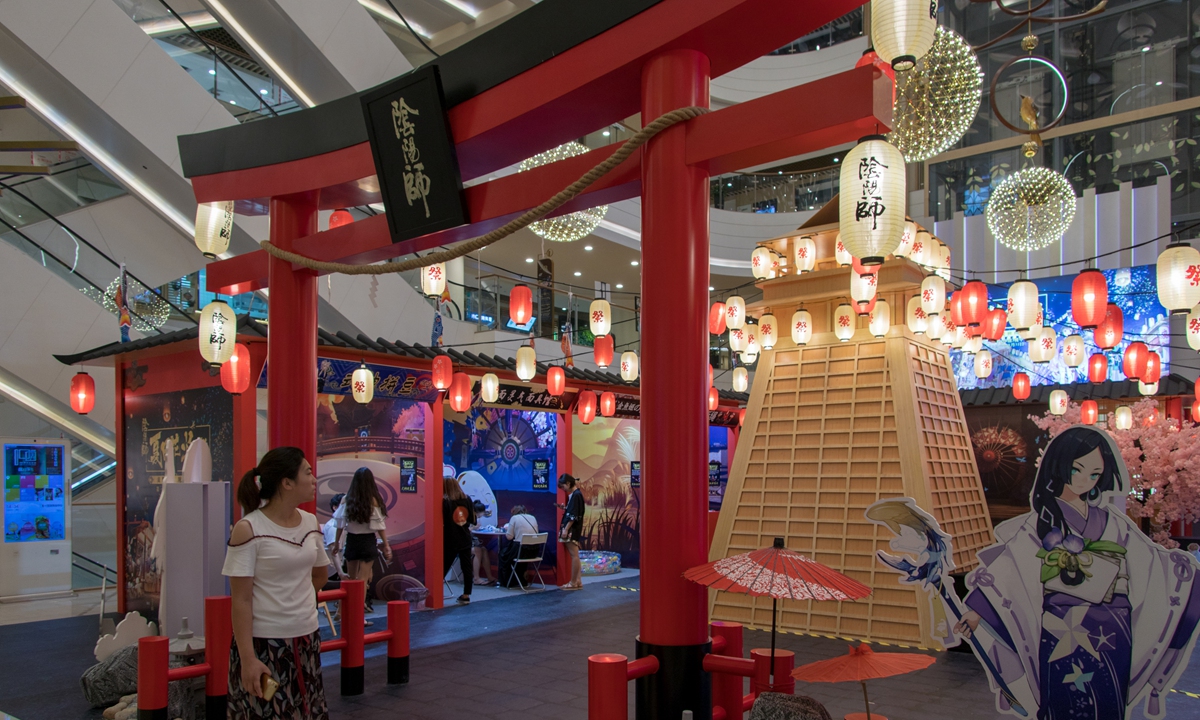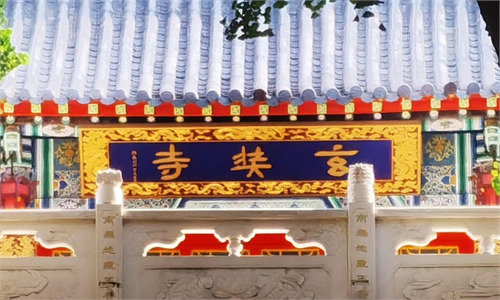
A Matsuri taking place in Shanghai back in 2018. Photo:IC
At least seven cities across the country have canceled the Japanese festivals known as Matsuri. While the majority of the Chinese public retains an open attitude toward Japanese culture, some recent incidents such as a woman detained in Nanjing for enshrining Japanese war criminals at a local temple and the public debate about people's reaction to the death of former Japanese prime minister Shinzo Abe have made some Japanese-related elements sensational amid deteriorating China-Japan relations.
In recent days, a number of exhibition halls and hotels have denied holding Summer Matsuri, especially after one scheduled for Nanjing, capital of East China's Jiangsu Province, was canceled as a growing number of netizens called for the boycott. The activity A-3×ComicDawn18, which was originally scheduled for July 17, was canceled due to the special location and the special meaning that the festival could convey, which aroused strong dissatisfaction among netizens.
The city of Nanjing has passed on painful and unforgettable memories about the Nanjing Massacre when the invading Japanese troops killed more than 300,000 Chinese civilians and unarmed soldiers during the War of Resistance against Japanese Aggression (1931-45).
Following the cancellation in Nanjing, a number of exhibitors and hotels in cities such as Dali of Southwest China's Yunnan Province, and Zaozhuang in East China's Shandong Province announced one after another plans to cancel the Summer Matsuri.
The Summer Matsuri has gradually become popular in China over the years, usually promoted by Japanese public diplomatic personnel, especially along the coastal region of China. It is frequently joined by Japanese living in China and Chinese students who have studied in Japan and those who are interested in Japanese culture, Liu Jiangyong, vice dean of the Institute of Modern International Relations at Tsinghua University, told the Global Times on Wednesday.
Though the Summer Matsuri is a carnival-type event in Japanese culture, which usually sees people dressing up, eating and gathering together with friends and families, the possibilities of some religious people using it as a platform to advertise religions or stretching it beyond the culture to other historical elements cannot be ruled out, Liu noted.
Some Chinese observers consider that although these festivals have been canceled lately in China, it does not show that the Chinese public is boycotting Japanese culture as whole, especially when ACGN culture (Anime, Comic, Game and Novel) has become widely popular among Chinese youth. However, the latest activities come at a time when Japanese elements are drawing much attention on Chinese social media, putting national feelings under the spotlight.
The incident of a woman named Wu Aping being detained for enshrining the memorial tablets of Japanese war criminals in a local temple in Nanjing has deeply hurt people's feelings, which has made it difficult to hold the Summer Matsuri now, Zhang Yiwu, a professor at Peking University, told the Global Times on Wednesday.
"Also the name Summer Matsuri could cause some controversies. The activity could become sensational under the overall environment," he said. However, the Chinese public generally accepts Japanese culture as long as it's not involving any element about World War II.
Similar public debates occurred before. A Japanese-themed shopping street that opened in Dalian, Northeast China's Liaoning Province triggered heated debates among Chinese netizens, with many questioning if it is appropriate to build a street run by Japanese firms in a place once deeply traumatized by the War of Resistance against Japanese Aggression. Amid growing doubts, the street was shut down.
The current wave of strong opposition among some Chinese netizens toward Summer Matsuri-related cultural activities occurs against the backdrop of deteriorating China-Japan ties, some experts explained.
Whether it is the Taiwan question, the Diaoyu Islands, or East China Sea and South China Sea related questions, the Japanese government, especially since the second term of Abe in office, has been taking China as an enemy, slandering and containing China, Liu said.
Also, recently, Japan's nuclear regulator approved the discharge plan of Fukushima nuclear-contaminated water, which also sparked widespread concern and public outrage on the Chinese internet, and some netizens called it an irresponsible move that poses serious threats to people's livelihoods and seafood consumption.
Some historical items set in the Summer Matsuri such as torii, which are most commonly found at the entrances of or within Japanese shrines, could easily remind people of the notorious Yasukuni Shrine that worships Class-A war criminals, experts noted.
Before, whether it was the Summer Matsuri or Comic-Con activity, it operated normally in China, and Chinese authorities had not ordered any bans on them, Zhang noted. "Now organizers should consider the overall public sentiment, although it could calm down one day in the future."



